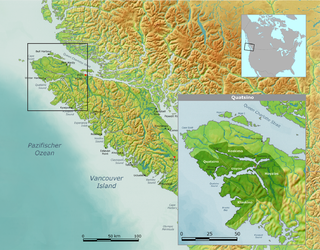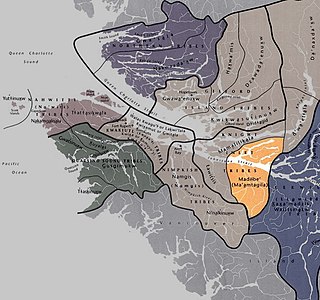This article is about the spiritual beliefs, histories and practices in Kwakwaka'wakw mythology. The Kwakwaka'wakw are a group of Indigenous nations, numbering about 5,500, who live in the central coast of British Columbia on northern Vancouver Island and the mainland. Kwakwaka'wakw translates into "Kwak'wala-speaking tribes." However, the individual tribes are single autonomous nations and do not view themselves collectively as one group.

A potlatch is a gift-giving feast practiced by Indigenous peoples of the Pacific Northwest Coast of Canada and the United States, among whom it is traditionally the primary governmental institution, legislative body, and economic system. This includes the Heiltsuk, Haida, Nuxalk, Tlingit, Makah, Tsimshian, Nuu-chah-nulth, Kwakwaka'wakw, and Coast Salish cultures. Potlatches are also a common feature of the peoples of the Interior and of the Subarctic adjoining the Northwest Coast, although mostly without the elaborate ritual and gift-giving economy of the coastal peoples.

The Kwakwa̱ka̱ʼwakw, also known as the Kwakiutl, are one of the indigenous peoples of the Pacific Northwest Coast. Their current population, according to a 2016 census, is 3,665. Most live in their traditional territory on northern Vancouver Island, nearby smaller islands including the Discovery Islands, and the adjacent British Columbia mainland. Some also live outside their homelands in urban areas such as Victoria and Vancouver. They are politically organized into 13 band governments.
The Winalagalis Treaty Group is a group of four First Nations band governments on Vancouver Island in the Canadian province of British Columbia, Canada. The group was formed to coordinate and administer negotiations with the government of the Province of British Columbia relating to unresolved treaty issues. It has opted engage in a separate round of negotiation from the rest of the Kwakwaka'wakw peoples. The member nations of the Winalagalis Treaty Group are Da'naxda'xw Awaetlatla Nation, Gwa'Sala-'Nakwaxda'xw Nation, Quatsino First Nation and Tlatlasikwala Nation.

The Quatsino First Nation is the First Nations band government of the Gwat'sinux subgroup of the Kwakwaka'wakw peoples, based in the Quatsino Sound region on the west coast of northern Vancouver Island in British Columbia, Canada, focused on the community of Coal Harbour in Quatsino Sound. It is a member of the Kwakiutl District Council and, for treaty negotiation purposes, the Winalagalis Treaty Group which includes three other members of the Kwakiutl District Council (the Da'naxda'xw Awaetlatla Nation, Gwa'Sala-Nakwaxda'xw Nation, and the Tlatlasikwala Nation.
The Da'naxda'xw Nation, or Da'naxda'xw/Awaetlatla Nation is a First Nation government in northern Vancouver Island in British Columbia, Canada, their main community is the community of Alert Bay, British Columbia in the Queen Charlotte Strait region. There are approximately 225 members of the Da'naxda'xw Nation. The Nation is a member of the Kwakiutl District Council and, for treaty negotiation purposes, the Winalagalis Treaty Group which includes three other members of the Kwakiutl District Council (the Quatsino First Nation, the Gwa'Sala-Nakwaxda'xw Nation, and the Tlatlasikwala Nation.

The Gwa'Sala-Nakwaxda'xw Nations are a union of two Kwakwaka'wakw peoples in a band government based on northern Vancouver Island in British Columbia, Canada, whose main reserve community is near the town of Port Hardy in the Queen Charlotte Strait region of the Central Coast region of British Columbia, Canada. The band government is a member of the Kwakiutl District Council and, for treaty negotiation purposes, the Winalagalis Treaty Group which includes three other members of the Kwakiutl District Council.
The Tlatlasikwala Nation is a First Nations band government based on northern Vancouver Island in British Columbia, Canada, focused on the community of Port Hardy, British Columbia in the Queen Charlotte Strait region. It is a member of the Kwakiutl District Council and, for treaty negotiation purposes, the Winalagalis Treaty Group which includes three other members of the Kwakiutl District Council (the Quatsino First Nation, the Da'naxda'xw Awaetlatla Nation, and the Gwa'Sala-'Nakwaxda'xw Nation.
The Kwakiutl District Council, also spelled Kwakwewlth District Council and Kwakiuth District Council, pronounced Kwagiulth District Council, is a First Nations Tribal Council based on Vancouver Island in British Columbia, Canada, based in the community of Campbell River, British Columbia in the northern Strait of Georgia but including member nations spanning northern Vancouver Island as far as Quatsino Sound. The nations represented within the Kwakiutl District Council are all Kwakwaka'wakw.

Kwaguʼł are a Kwakwakaʼwakw tribe of the Indigenous peoples of the Pacific Northwest Coast from central British Columbia, on northern Vancouver Island. Their main community is called Tsax̱is or Fort Rupert. The ancestral language is Kwakʼwala, a language that is a part of the Wakashan language group. In their language, Kwaguʼł translates to Smoke-Around-the-World referring to the smoke that exited from the many bighouses in their villages.

The Mamalilikala are an indigenous nation, a part of the Kwakwaka'wakw, in central British Columbia, on northern Vancouver Island. Their main village was Memkumlis ('Mimkwamlis), located on Village Island. Their Indian Act band government is the Mamalilikulla-Qwe'Qwa'Sot'Em First Nation.

The 'Namgis are an Indigenous nation, a part of the Kwakwaka'wakw, in central British Columbia, on northern Vancouver Island. Their main village is now Yalis, on Cormorant Island adjacent to Alert Bay. The Indian Act First Nations government of this nation is the Namgis First Nation. They were formerly known as the Nimpkish.
Smith Sound is a sound on the Central Coast of British Columbia, Canada, located to the south of Rivers Inlet and between the Queen Charlotte Strait region (S) and Fitz Hugh Sound (N).
Smith Inlet is an inlet at the head of Smith Sound on the Central Coast of British Columbia, Canada. Smith Inlet and Smith Sound are notable as the home of the Gwaʼsala group of the Kwakwakaʼwakw peoples, who are also known as the Smith Inlet people. Nekite Indian Reserve No. 2, which is under the governance of the Gwaʼsala-ʼNakwaxdaʼxw Nations band government, is located at the head of Smith Inlet, at the mouth of the Nekite River.
The Tlowitsis Nation, formerly the Klowitsis Tribe, the Turnour Island Band and the Tlowitsis-Mumtagila First Nation, is the Indian Act band government of the Ławit'sis (Tlowitsis) tribe of the Kwakwaka'wakw peoples, located in the Queen Charlotte Strait-Johnstone Strait area in the Discovery Islands between Vancouver Island and the British Columbia mainland in Canada. Ławit'sis territory covers parts of northern Vancouver Island, Johnstone Strait, and adjoining inlets of the mainland. Kalugwis, on Turnour Island, was their principal community in times past, but the band's offices are in the city of Campbell River to the southeast. Hanatsa IR No. 6 on Port Neville is the most populated of the band's Indian reserves.
'Kwakwaka'wakw music is a sacred and ancient art of the Kwakwaka'wakw peoples that has been practiced for thousands of years. The Kwakwaka'wakw are a collective of twenty-five nations of the Wakashan language family who altogether form part of a larger identity comprising the Indigenous Peoples of the Pacific Northwest Coast, located in what is known today as British Columbia, Canada.
Mahpahkum Indian Reserve No. 4, officially Mahpahkum 4, is an Indian reserve at the northwest end of Deserters Island in the Deserters Group of the Queen Charlotte Strait region of the Central Coast of British Columbia, Canada. It is 7.8 hectares in size and is one of the reserves under the governance of the Gwa'Sala-Nakwaxda'xw band government of the Kwakwaka'wakw peoples.
The Gwa'sala are one of the main groups of the Kwakwaka'wakw peoples, now joined with the 'Nak'waxda'xw (Nakoaktok) in the Gwa'sala-'Nakwaxda'xw Nations band government. Their traditional home and still-territory is around Smith Sound and Smith Inlet, while that of the 'Nakwaxda'xw is at Blunden Harbour farther south on the north side of Queen Charlotte Strait.
Kalugwis, or Karlukwees or Qalogwis, is the principal community of the Tlowitsis Nation of the Kwakwaka'wakw peoples of the Johnstone Strait region of the South Coast of British Columbia, Canada. It is located on the south shore of Turnour Island facing Beware Passage and is within Karlukwees Indian Reserve No. 1, a.k.a. Karlukwees 1, 10.8 ha.

The Ma’amtagila First Nation (also styled Maamtagila), formerly known as Mahteelthpe or Matilpi, are an Indigenous nation and part of the Kwakwaka'wakw peoples. Their territory is located in the Queen Charlotte Strait-Johnstone Strait area in the Discovery Islands between Vancouver Island and the British Columbia mainland in Canada.









